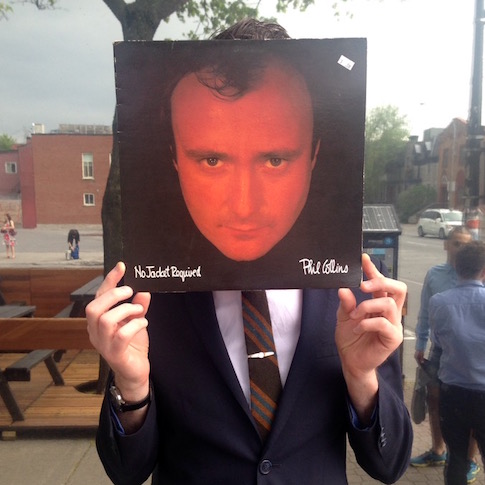The single greatest failure of the music industry in my lifetime was its inability to convince people that £15 for an album wasn’t expensive. Imagine someone giving you a pint glass, charging you £15 and saying you could refill it with beer as often as you liked for the rest of your life. That’s as close as I can get to articulating music’s worth to me.
So I pay for music, and hope to always pay for music, because my morality tells me that anything of value should be paid for. But I’m not paying enough, and I feel bad about it.
I use Spotify, or the MP3s I have in iTunes. I mostly use Soundcloud for unsigned stuff if someone’s asking me to manage them or they’re just after an opinion, and occasionally I’ll play something on YouTube, some old minimalist techno track I used to have on 12”, before the internet came along and facilitated the theft of music and the proliferation of cat memes.
My Spotify subscription is via my Vodafone contract, and as CMU’s Chris Cooke pointed out recently the future of the music business is partly in the hands of telephone companies, as long as labels and artists continue to sit back and let someone else push the idea of paid subscriptions to consumers. Well anyway, I pay £10 a month to listen to as much music as I want. It’s madness, but I realise the boat named Music Has an Intrinsic Monetary Value has long since been shipwrecked on The Rocks of Content, and I’m not here to argue for a return to CDs and the abolition of streaming services. I don’t have beef with streaming services as platforms; they’ve had a significant role in giving recorded music economic value again.
In 2012, Erased Tapes released a Nils Frahm album called ‘Screws’ for free. Just him and a piano. I downloaded the MP3s. After a couple of listens I realised I was going to have it on repeat for a while, so I asked Nils and the label via Twitter if I could wire them some money for it, 1€ per track. They gave me a PayPal address and I went ahead. I’ve no idea how they split the 9€ between then, but I felt better about having paid it.
Since then I’ve conveniently listened to music via Spotify while they pay the artists I like (and the artists I manage) a pittance. I know the deals some artists have with their labels has an impact on what they earn, but regardless, Spotify’s pro-rata system is unfair. If my £10 went only to the artists (and their labels) that I listened to, I wouldn’t have a problem. But it doesn’t. The pro-rata system means my £10 goes into a large pot with everyone else’s £10, and from that pot each artist gets given a percentage of the overall income based on how many streams they have. Some of my £10 goes into the pockets of artists I don’t play, and don’t like. Some of my £10 goes into Drake’s pocket. It can’t be beyond the streaming companies to look at what each subscriber plays each month and allocate 70% (or whatever the deal is) of the subscriber’s £10 to those rights holders only.
My colleague Daniel Nordgård, a researcher at University of Agder’s Department of Popular Music in Kristiansand has published his findings on the digitalisation of music, and reports that the majority of people today pay more for recorded music than they ever did. He and I, on the other hand, pay nothing compared to our old habits. We represent a fraction of the market and our spending has relatively speaking evaporated when compared to the days when we both bought enough vinyl and CDs to force our parents out of their own attics.
In recent years I’ve allowed cognitive dissonance to get in the way of what’s morally right: complaining about how Spotify pay artists while continuing to use Spotify, so I’m contacting all the artists whose music I’ve played a lot to ask if I can pay them £1 or $1 or 1€ per song that I’ve liked enough to return to multiple times. I’m also contacting artists who’ve sent me music with a view to working together, or because we already work together. Getting paid as Jenny Hval’s International Advisor doesn’t mean that I shouldn’t pay for the two albums she sent me before release. She created art, it has value, I value it highly. I’m utterly in love with Braids yet paid them not a penny for the countless times I’ve listened to their music. It doesn’t make any sense. I should probably pay labels too. They’re not having an easy time and I care about that. I’ve already met with embarrassed resistance – “just buy me a pint next time you see me” – and silence. Many people feel uncomfortable talking about money. Some probably think it’s just weird. “There’s this guy trying to give us money for our album… can’t he just buy a physical copy?” Not really; I don’t live anywhere, so can’t amass ‘stuff’. “Go to a live show and buy a T-shirt?” More stuff I don’t need and have no space for in my bag. I just want to listen to music and pay what it’s worth to me.
In my most optimistic moments, I can maybe imagine the streaming services (including YouTube) making some very small concessions to those who’re lobbying for a more equitable payment structure, but nothing more than that. I can’t foresee a significant departure from the pro-rata system, which leaves those of us who place a high value on music and who wish to act on it with less-than-perfect methods. My way is hardly scaleable, though it wouldn’t take much for bands to set up a simple payment system and publicise it. And who I choose to pay is subject to my own judgements, whims and ethics. Hardly scientific, but it’s something, and the best I can come up with on my own.
However we choose to do it, I believe we need to challenge the models that have been negotiated in our absence and do more to create sustainable models to ensure our artists are free to create and present their art.
Any ideas?
With thanks to Daniel Nordgård, Kate Hewett, William Doyle and Howard Monk for critical analysis
Picture: expressing my unironic love for Phil Collins. Jacket required

